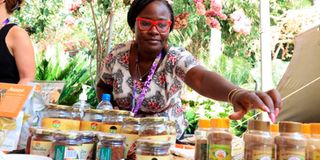Kenya gender ranking on education, economic inclusion drops

Alliance Girls High School students with senior Kenya Revenue Authority women leadership team when they visited the school for a mentoring session on International Women's Day 2021.
What you need to know:
- Kenya's gap in the education and economic front has worsened in the last 15 years.
- In 2021, Kenya has been ranked 84th on women participation in economic activities, which is a sharp drop from 40th in 2006.
- Kenya also lost ground on education opportunities for women, managing position 126 in 2021, a sharp drop from position 88 some 15 years ago.
More women in Kenya are being locked out of education and employment opportunities than in the past 15 years, a new report shows, dealing a blow to efforts of reducing a huge gender development gap.
This gap in the education and economic front has worsened in the period, eroding the plight of women in the country’s development agenda.
The latest Global Gender Gap Report for 2021 by the World Economic Forum ranks Kenya at position 95 overall out of 156 — down from position 73 in 2006.
This is mainly due to slips in the education and economic involvement of women. In 2021, Kenya has been ranked 84th on women participation in economic activities, which is a sharp drop from 40th in 2006.
Kenya also lost ground on education opportunities for women, managing position 126 in 2021, a sharp drop from position 88 some 15 years ago.
The report that benchmarks the evolution of gender-based gaps among four key dimensions including Economic Participation, Educational Attainment, Health and Political Empowerment tracks progress towards closing these gaps.
“The slow progress seen in closing the economic participation and opportunity gap is the result of two opposing trends. On [the] one hand, the proportion of women among skilled professionals continues to increase, as does progress towards wage equality, albeit at a slower pace. On the other hand, overall income disparities are still only part-way towards being bridged and there is a persistent lack of women in leadership positions, with women representing just 27 per cent of all manager positions,” says the report.
Female-owned businesses
In Kenya, the number of female-owned businesses remains low compared to their male counterparts with figures by the Kenya National Bureau of Statistics (KNBS) showing that about 30 per cent of small and medium enterprises are owned by women.
This is the case despite other studies showing that women have bigger potential for entrepreneurship.
For instance, a survey by the World Bank last year, showed that women-led businesses in Kenya have a bigger investment impact, supporting huge portions of household budgets, solidifying the need for deeper special financing for such enterprises.
According to the World Bank study, in Kenya, firm-level profits earned by female entrepreneurs represent on average 65 per cent of their household income while these businesses mainly employ women — boosting their multiplier financial effects both on the national economy and on households.
“Women-led businesses mostly employ women, which shows they can be a catalyst for bringing more women into the workforce. About 75 per cent of the workers in female-owned enterprises are women (when excluding the business owner), while in male-owned businesses, only 20 per cent of employees are women,” the study showed.
Women enterprises in Kenya have been hampered by lack of access to affordable credit. While one in five women traders owned their business premises, the World Bank says, most of the businesses were lowly capitalised compared to the male-owned businesses that typically had capital up to six times larger than that of female-owned firms.

Ms Anzazi Kiti displays her products during Pop up Expo Market held on March 6, 2021 at Zen Garden, Nairobi to empower female entrepreneurs in showcasing their talents. Kenya National Bureau of Statistics shows only about 30 per cent of small and medium enterprises are owned by women.
Most women, it found, relied on micro-credit facilities run on mobile apps where money borrowed was paid within days, allowing the women traders to borrow afresh the next day.
The women traders, known to have a higher score in repaying loans than men mostly operate in makeshift sheds that do not require connection to electricity as opposed to male traders.
Women economic empowerment in Kenya has also been inhibited by disparities in compensation in the workplace.
A report by the Nairobi Securities Exchange (NSE) revealed that, on average, a Kenyan woman is paid Sh68 for every Sh100 paid to a man, revealing a gender pay gap.
The report also showed that women are under-represented in senior roles at the Nairobi bourse companies, denying them the higher salaries that come with such positions.
According to the KNBS, most women have been condemned to low paid sectors while men dominate higher paid sectors, worsening the opportunities gap.
The data points out that women are pre-dominant in household and social work acuities by 60.6 per cent and 57.7 per cent respectively. On the other hand, men dominate high paying sector such as manufacturing and real estate by 79.6 per cent and 76.1 per cent in that order.
High-paying jobs
The lack of women representation in high-paying jobs could come from the fact that girls are still locked out of school.
Education is a critical component of human capital that increases the opportunity of an individual to participate in the economy.
Despite 121 countries closing the educational gender gap by at least 95 per cent, Kenya is among the countries where the rate of women’s literacy is significantly lower than that of men.
Kenya provides free primary and secondary school education for both boys and girls. This has played a big role to ensuring almost equal ratio of students enrolled in schools. However, in the tertiary level where parents are expected to pay children’s school fees, the difference become extreme.
For instance, in 2019, about 5.1 million (50.6 per cent) of primary school students were boys and 4.96 million (49.3 per cent) were girls. In secondary schools, they tied at 1.63 million.
Data by the KNBS reveals that about 303,034 or 60 per cent of students in public and private universities were men, while 206,439 or 40 per cent were female.
“Development challenges impede primary, secondary, and higher educational attainment for both girls and boys. More must be done to reduce gender gaps while equipping new generations with the skills of the future to participate in and contribute to the economic development of their countries,” the WEF report notes.
Despite being a laggard on education and economic empowerment of women, Kenya has posted improvements in healthcare and political participation.
The gender gap report shows Kenya improved its ranking in the health and survival index to position 60 in 2021 compared to 96 in 2006.
Most dangerous countries for a woman
Kenya has, in recent years, stepped up funding for women healthcare programmes amid concerns over high maternal mortality rates.
Estimates by the United Nations Population Fund (UNFPA) show the number of women dying of pregnancy-related causes in Kenya stands at about 488 deaths per 100,000 live births, leaving the country ranked among the 10 most dangerous countries for a woman to give birth in the world.
This situation has been attributed to limited use of skilled care and low health facility coverage.
For these reasons, the government and its development partners have stepped up expansion of maternal healthcare, including construction of more labour wards and clinics to curb deaths.
Besides maternal healthcare, the Global Gender Report 2021 shows that Kenya has also narrowed the gap in women representation in politics.

President Uhuru Kenyatta during a meeting with political party leaders at State House, Nairobi. Present at the presser are party leaders; Gideon Moi (KANU), Musalia Mudavadi (ANC), Kalonzo Musyoka (WIPER), Raila Odinga (ODM), Charity Ngilu (NARC) and Mosses Wetangula (FORD Kenya).
The country is ranked 79th in women participation in politics in 2021 compared to 93rd in 2006.
Though there has been improvement in the number of women in the legislature, their number is still below the constitutional threshold.
Under the constitutional two-thirds gender rule, the dominant gender should only occupy 66.66 per cent of public offices.
But currently, men dominate the National Assembly as only 59 out of 349 MPs are females.
This means that the 290 male MPs occupy 83 per cent of the seats. In the Senate, the 47 male lawmakers account for 70 per cent of the available seats.
President Uhuru Kenyatta’s government was recently put on the spot after the Supreme Court recommended the dissolution of the National Assembly for non-compliance with the two-thirds gender rule.
This story was first published in Business Daily : https://www.businessdailyafrica.com/bd/data-hub/kenya-gender-ranking-drops-on-education-economic-exclusion-3351044





